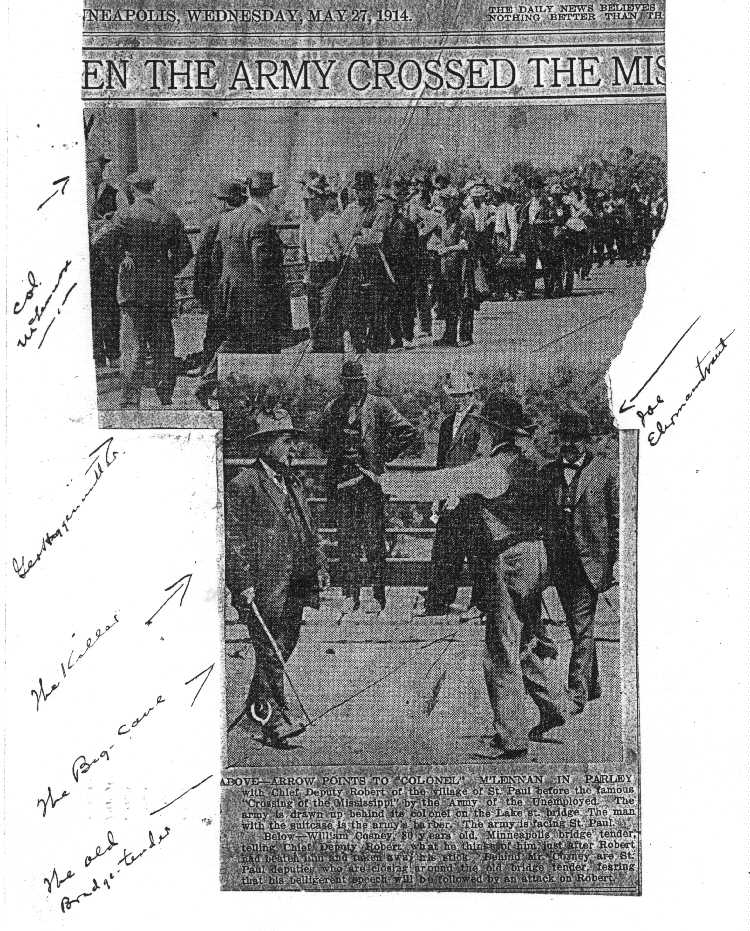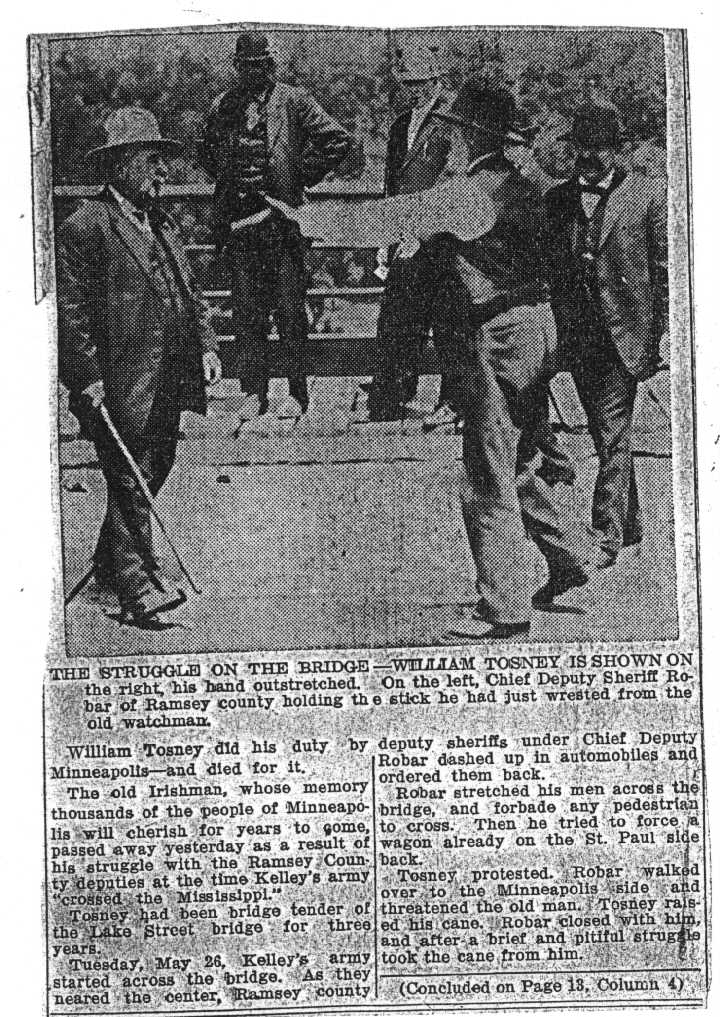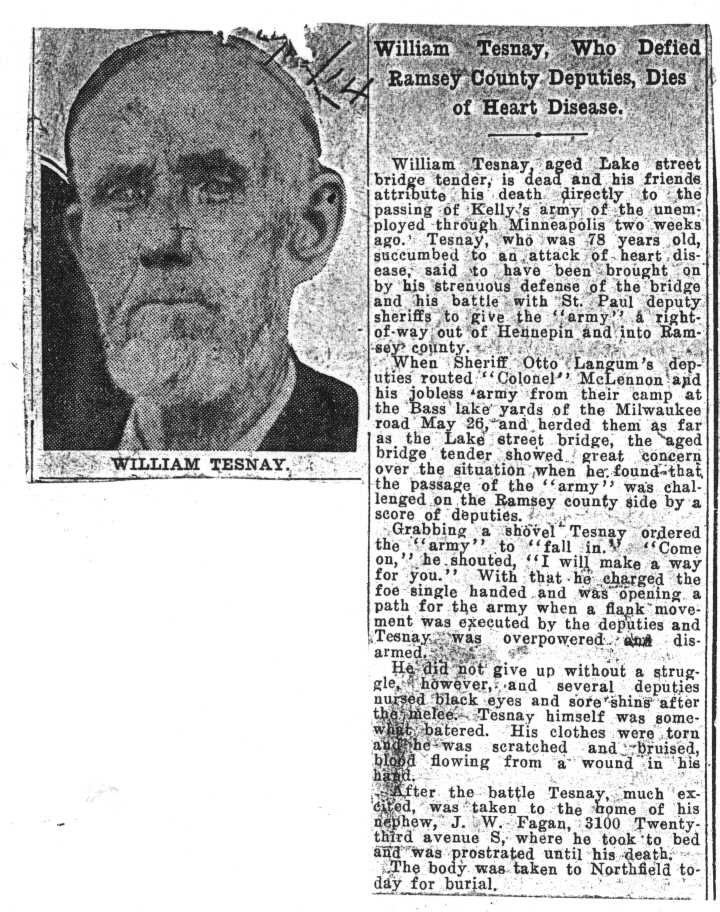Kelly's Army
(Editor's Note: This story also exists in two versions, a manuscript version that Pip wrote for his family and a typescript for a speech. I am basing this text on the manuscript with a few additions from the typescript. The manuscript contains copies of three newspaper articles and photos that provide an interesting counterpoint to Pip's story.)
In the summer of 1914, Kelly's Army organized in the Dakotas and, on their way to Washington, landed in Minneapolis. They had commited depredations along the way. Word was sent to the Sheriff to forbid them from marching through St. Paul
A phone message came to the Sheriff that Kelly's Army was making its way to St. Paul. I took several deputies and made a quick trip to Franklin Bridge, spanning the Mississippi River between St. Paul and Minneapolis, the route taken by the Army. I got to the center of the bridge, on came the Army some 150 strong. When within a few feet of me, I commanded, "Halt! Stop in the name of the State of Minnesota!" I asked for the leader and a handsome young fellow presented himself and stated he was Colonel McLennon, in charge of the army. I immediately detected he was a Frenchman (a Cannuck). I spoke to him in French . He answered me very fluently, told me their troubles, they were hungry and were ordered away by the Sheriff of Hennepin Co. While conversing with the Colonel, William Tesney, the Bridgetender, raised his heavy cane and threatened Joe Ehrmintraut, one of the deputies. I grabbed his cane and threw it in the river . The tender (who was about 80 years old) said he would have us arrested and he proceeded to the Minneapolis side to get the police. I told the Colonel to send two men to the sheriff's office and arrangements would be made to transport them by cars to South St. Paul and there we would see that they would be provided with grub. After consulting with the Chief of Police at Minneapolis and the Street Car Company it was arranged to convey them through South St. Paul without debarking. This was accomplished and arrangements made with Swift and Company to feed the gang.
Sheriff Wagener provided them bread wieners and coffee. It cost the Sheriff $27.00. He cussed a bit but he paid. The old bridge tender dropped dead the next day. The Minneapolis newspapers stated I killed and murdered him. I never laid hands on him except to suddenly take his cane and throw it away, nor was I ever arrested. All that appeared in the newspapers was Bunk and, like all news items, made sensational for its readers and for those who like the ravings of the Swamp-Angels and what they write for the Smith machine .
A few days afterwards, the Army was routed out of Dakota Co. and, in fact, every Co. in the state until it reached Chicago, Ill.
Kelly's Army: Most of this paragraph comes from the typewritten speech. Pip calls the army "Coxey's Army" there. In the manuscripts he calls it Kelly's Army which is the name used by the newspapers. It isn't Coxey's Army. Coxey's Army of the Unemployed was organized in 1894 in Ohio and marched to Washington where they were dispersed. Kelly's Army appears to have been inspired by Coxey's Army, but 20 years later and no more successful.
I grabbed his cane and threw it in the river. The newspaper photographs seem to bear out Pip's version of events. The photo of Pip talking to McLennon shows an orderly "army" in column behind it's leader. The photo of Pip, Ehrmintraut, and Tesney after Pip had taken away the cane shows a very lively Tesney expressing his opinion of Pip quite freely. This is after Pip and the other deputies had "beaten" (according to some of the newspaper stories) the old man. Pip is shown holding the cane at his side. He must have thrown it into the river later. The anticlimatic resolution of this confrontation also suggests that less happened than the newspapers reported. It sounds like Pip and McLennon were well on their way to a resolution to the situation when the bridge tender, who, undoubtedly, knew no Quebecois, intervened.
Swamp-Angels and Smith machine: Robert A. Smith was mayor of St. Paul from 1887-1892, 1894-1896, and from 1900-1908. "Swamp-Angels" appears to refer to newspaper reporters. "Swamp-Angels" could also refer to mosquitos.
Through South St. Paul: And, therefore, out of Ramsey County and Pip's responsibility. This placed the Army in Dakota County.
This site created by Harry E. Connors III
Music is La Bastringue sequenced by Barry Taylor
Please e-mail me with any additions, corrections, and comments
The following is the first of three newspaper clippings that accompany this story.
The caption reads: ABOVE--ARROW POINTS TO "COLONEL" M'LENNAN IN PARLEY with Chief Deputy Robert of the village of St. Paul before the famous "Crossing of the Mississippi" by the Army of the Unemployed. The army is drawn up behind its colonel on the Lake st. bridge. The man with the suitcase is the army's barber. The army is facing St. Paul.
Below--William Cosney, 80 years old, Minneapolis bridge tender, telling Chief Deputy Robert what he thinks of him just after Robert had beaten him and taken away his stick. Behind Mr. Cosney are St. Paul deputies who are closing around the old bridge tender, fearing that his belligerent speech will be followed by an attack on Robert.
The second of the three newspaper clippings that accompany this story.
A handwritten note attached to this clipping says that Joe Ehrmintraut died on November 14, 1932.
The third of the three newspaper clippings that accompany this story.




This page last modified on Wednesday, November 21, 2007
Pip's Stories